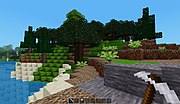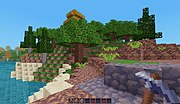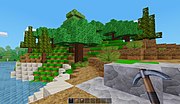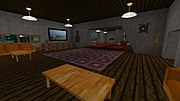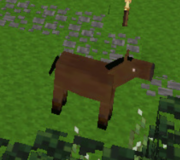Minetest: Difference between revisions
←Created page with '{{subst:AFC submission/draftnew}}<!-- Important, do not remove this line before article has been created. --> {{Infobox software |name = Minetest |logo = minete...' |
mNo edit summary |
||
| (497 intermediate revisions by more than 100 users not shown) | |||
| Line 1: | Line 1: | ||
{{Short description|Open-source voxel game engine}} |
|||
{{AFC submission|t||ts=20180123140223|u=180.243.212.195|ns=118|demo=}}<!-- Important, do not remove this line before article has been created. --> |
|||
{{Use mdy dates|date=June 2020}} |
|||
{{Italic title}} |
|||
{{Too technical|date=June 2024}} |
|||
{{Infobox software |
{{Infobox software |
||
|name = |
| name = Luanti |
||
|logo = |
| logo = Minetest logo.svg |
||
|logo alt = Minetest Logo |
| logo alt = Minetest Logo |
||
|screenshot = Minetest |
| screenshot = Minetest high-res texture pack 2.png |
||
| released = 0.0.1 / {{Start date and age|2010|11|02}} |
|||
|screenshot alt = Screenshot of Minetest with damage enabled. |
|||
| latest release version = {{wikidata|property|preferred|references|edit|Q89114416|P348}} |
|||
|released = February 2011 |
|||
| latest release date = {{wikidata|qualifier|preferred|single|Q89114416|P348|P577}} |
|||
|author = Perttu Ahola |
|||
| latest preview version = {{wikidata|property|preferred|references|edit|Q89114416|P348|P548=Q51930650}} |
|||
|developer = sfan5, ShadowNinja, Nathanaël Courant, Loic Blot, paramat, Craig Robbins, Auke Kok, rubenwardy, Krock/SmallJoker |
|||
| latest preview date = {{wikidata|qualifier|preferred|single|Q89114416|P348|P548=Q51930650|P577}} |
|||
|repo = {{url|https://github.com/minetest/minetest}} |
|||
| author = Perttu Ahola |
|||
|platform = [[Linux]], [[FreeBSD]], [[Microsoft Windows]], [[MacOS]], [[Android (operating system) | Android]] |
|||
| developer = [https://www.luanti.org/credits/ The Luanti Team] |
|||
|license = GNU Lesser General Public License |
|||
| repo = {{URL|https://github.com/minetest/minetest}} |
|||
| engine = [[Irrlicht Engine|Irrlicht]] (Irrlicht-MT fork) |
|||
| programming language = [[C++]], [[Lua (programming language)|Lua]] |
|||
| platform = [[Microsoft Windows]], [[MacOS]], [[Linux]], [[FreeBSD]], [[Android (operating system)|Android]] |
|||
| genre = [[Sandbox game|Sandbox]] |
|||
| license = 2013: [[GNU Lesser General Public License|LGPL-2.1-or-later]]<ref name="LICENSE.txt">{{cite web|url=https://github.com/minetest/minetest/blob/master/LICENSE.txt|title=LICENSE.txt|website=[[GitHub]]|date=October 25, 2021|access-date=July 8, 2021|archive-date=January 3, 2023|archive-url=https://web.archive.org/web/20230103131726/https://github.com/minetest/minetest/blob/master/LICENSE.txt|url-status=live}}</ref><ref name="2013-lgpl">{{cite web|url=https://github.com/minetest/minetest/commit/f0edd88dff26f408db895046b9411248ff3d51dd|title=Remove doc/gpl-2.0.txt, add doc/lgpl-2.1.txt|website=[[GitHub]]|date=2013-09-28|access-date=July 8, 2021|archive-date=August 6, 2021|archive-url=https://web.archive.org/web/20210806132856/https://github.com/minetest/minetest/commit/f0edd88dff26f408db895046b9411248ff3d51dd|url-status=live}}</ref><br />2010: [[GNU General Public License|GPL-2.0-or-later]]<ref name="2012-lgpl-gpl">{{cite web|url=https://github.com/minetest/minetest/commit/037b2591971d752e67fa7d47095b996b3f56da5a|title=Switch the license to be LGPLv2/later, with small parts still remaining as GPLv2/later, by agreement of major contributors|website=[[GitHub]]|date=2012-06-05|access-date=July 8, 2021|archive-date=August 6, 2021|archive-url=https://web.archive.org/web/20210806132858/https://github.com/minetest/minetest/commit/037b2591971d752e67fa7d47095b996b3f56da5a|url-status=live}}</ref><ref name="2010-gpl">{{cite web|url=https://github.com/minetest/minetest/commit/24c4b7c68d283a4d1de72a3eb68f1268f1fe34e3|title=Working version before block send priorization update|website=[[GitHub]]|date=2010-11-27|access-date=July 8, 2021|archive-date=August 6, 2021|archive-url=https://web.archive.org/web/20210806132856/https://github.com/minetest/minetest/commit/24c4b7c68d283a4d1de72a3eb68f1268f1fe34e3|url-status=live}}</ref><br />Original: [[Proprietary software|Proprietary]]<ref name="2010-proprietary">{{cite web|url=https://github.com/minetest/minetest/commit/4e249fb3fbf75f0359758760d88e22aa5b14533c|title=Initial files|website=[[GitHub]]|date=2010-11-26|access-date=July 8, 2021|archive-date=August 6, 2021|archive-url=https://web.archive.org/web/20210806132903/https://github.com/minetest/minetest/commit/4e249fb3fbf75f0359758760d88e22aa5b14533c|url-status=live}}</ref> |
|||
| website = {{URL|https://www.luanti.org/}} |
|||
}} |
}} |
||
'''''Luanti''''' (formerly and colloquially '''''Minetest''''') is a [[free and open-source]] [[voxel]] [[game creation system]]. It is written primarily in [[C++]] and makes use of the [[Irrlicht Engine]]. ''Luanti'' has a [[Lua (programming language)|Lua]] [[API]] allowing users to write their own games and [[Mod (video games)|mods]]. It is [[Cross-platform software|cross-platform]], being available for [[Microsoft Windows]], [[macOS]], [[Linux]], some [[Berkeley Software Distribution|BSD descendants]], some [[GNU variants]] and [[Android (operating system)|Android]].<ref>{{Cite web |date=11 December 2023 |title=Minetest |url=https://www.minetest.net/ |access-date=11 December 2023 |archive-url=https://web.archive.org/web/20231211175139/https://www.minetest.net/|archive-date=11 December 2023}}</ref> |
|||
An in-game browser lets users download games and modifications from the [https://content.minetest.net ContentDB] website.<ref name=":0">{{Cite web |date=11 December 2023 |title=Content Flags |url=https://content.minetest.net/help/content_flags/ |access-date=11 December 2023 |archive-url=https://web.archive.org/web/20231211190731/https://content.minetest.net/help/content_flags/ |archive-date=11 December 2023}}</ref> The five most popular games by downloads are ''VoxeLibre'', ''Minetest Game'', ''NodeCore'', ''Tutorial'' and ''Subway Miner''.<ref>{{Cite web |title=Games |url=https://content.minetest.net/packages/?type=game&sort=downloads |access-date=2024-05-28 |website=ContentDB}}</ref> |
|||
'''Minetest''' is an open source sandbox game inspired by [[Minecraft]]. It is available for [[Linux]], [[FreeBSD]], [[Microsoft Windows]], [[MacOS]], and [[Android (operating system) | Android]].<ref> {{cite web | url=http://minetest.net | title=Minetest Website}}</ref> The game retains many elements from Minecraft, most notably, the pixelated graphics and interface. |
|||
Over a decade of active development ''Luanti'' has garnered critical acclaim and gained in popularity; the games, mods and texturepacks on ContentDB have over 14 million downloads combined,<ref name=":1">{{Cite web |title=Welcome |url=https://content.minetest.net/ |access-date=2024-10-14 |website=ContentDB |quote=CDB has 2526 packages, with a total of 14871145 downloads.}}</ref> and the Android version of ''Luanti'' has over a million downloads on the [[Google Play]] store.<ref>{{Cite web |title=minetest - Android Apps on Google Play |url=https://play.google.com/store/search?q=minetest&c=apps |access-date=2024-05-28 |website=play.google.com |language=en-US}}</ref> |
|||
Minetest is often referred to as the engine, with gameplay provided by subgames, which are a collection of mods and files. <ref> {{cite web | url=https://wiki.minetest.net/Subgames#Introduction | title=Subgames - Minetest Wiki}}</ref> Subgames provide functionality of the game. For example, the default Minetest Game subgame focuses on building, while Minetest Saturn subgame is a space simulation. The game may be modded by modifications, usually dubbed mods. Mods may add items, mobs, weather, and more. |
|||
In October 2024 the name was changed from ''Minetest'' to ''Luanti''. The new name is a word play using the name of the [[programming language]] ''[[Lua (programming language)|Lua]]'' and the [[Finnish language|Finnish]] word "''luonti''" meaning "''creation''".<ref name="newname">{{Cite web |title=Introducing Our New Name |url=https://blog.minetest.net/2024/10/13/Introducing-Our-New-Name/ |access-date=2024-10-13 |website=Minetest Blog |language=en}}</ref> |
|||
== Gameplay == |
== Gameplay == |
||
[[File:Minetest-5.3.0-dry-green-jungle-biomes.jpg|thumb|alt=The meeting of dry plains, green plains, and jungles|[[Player character]] near dry plains, green plains, and jungle biomes]] |
|||
The default Minetest subgame behaves similarly to Minecraft. Players can toggle damage, and creative mode, which grants them unlimited resources. There are a variety of blocks to choose from, most of them being made up of natural resources and ores, but also artificial materials such as wool or wooden planks. Minetest also has items, comprising of swords, pickaxes, and other tools. |
|||
The game world of all ''Luanti'' games is composed of voxels which are mostly cubes aligned in a 3D grid, but the player and creatures can move around freely. In ''Luanti'' voxels are called nodes. Different nodes represent various materials, such as dirt, stone, ores, tree trunks, water, and lava. |
|||
The most popular games for ''Luanti'' are ''VoxeLibre'' (formerly ''Mineclone2'') and ''Minetest Game''.<ref>{{Cite web |title=Games |url=https://content.minetest.net/packages/?type=game |access-date=2024-05-28 |website=ContentDB}}</ref> Both are [[Sandbox game|sandbox]] building games. |
|||
== Multiplayer == |
|||
The game lets players host their own servers, or play online via a page where they can search for public servers or enter an address. |
|||
''VoxeLibre'' is a full game with animals, monsters, interesting biomes, whereas ''Minetest Game'' is a lifeless sandbox with mostly landscape nodes. |
|||
== Gallery == |
|||
<gallery> |
|||
While technically playable without, ''Minetest Game'' relies on modifications to add creatures, more biomes, gameplay mechanics, armours, weapons, tools, decorative nodes and so on. |
|||
File:Minetest-zh.png|The Minetest main menu. |
|||
File:2012-10-20-152616 800x597 scrot.png|Screenshot of Minetest with its former name, Minetest-c55. |
|||
The gameplay of ''VoxeLibre'' revolves around picking up and placing these nodes, gathering materials, crafting items and nodes by placing them in a crafting grid in the inventory window, smelting ores in the oven, farming crops, animal husbandry, eating food and defeating monsters to survive. Some nodes can only be picked up with certain held tools the player has to craft. |
|||
File:HDX Screenshot.png|A screenshot showing Minetest with a texture pack installed. |
|||
</gallery> |
|||
[[File:Minetest-5.3.0-snow-ice-biomes.jpg|thumb|left|alt=Snowy conifers at the edge of ice plains|Snowy conifer biome at the edge of ice plains]] |
|||
As players explore the world, new areas are [[Procedural generation|procedurally generated]], using a map [[Random seed|seed]] specified by the player. A new game puts the player in the center of a voxel cube 62 thousand nodes across, so the player can travel 31 thousand nodes in any direction (sideways, up, or down)<ref>{{Cite web|url=https://www.minetest.net/|title=Official website|access-date=February 28, 2021|archive-date=February 26, 2021|archive-url=https://web.archive.org/web/20210226155338/https://www.minetest.net/|url-status=live}}</ref> before reaching the [[invisible wall]] at the end of the world. |
|||
The world is divided into [[biome]]s ranging from deserts to jungles to snowfields; the terrain includes plains, mountains, forests, caves, and various lava/water bodies. The in-game time system follows a day and night cycle, and one full cycle lasts 20 real-time minutes. |
|||
''Luanti'' provides two play style options across games: ''Enable Damage'' and ''Creative Mode''. Disabling damage prevents dying, thus losing items and the possible frustration it might cause and Creative Mode provides players with infinite resources to build whatever they want without having to gather them first.<ref>{{Cite web |title=Minetest, Free and Open Source Sandbox Game... {{!}} Linux Game News • Minetest, Free and Open Source Sandbox Game Inspired by Minecraft |url=https://linuxgamenews.com/post/21387368393/minetest-free-and-open-source-sandbox-game-inspired-by-m#.UDoHj6BF8gU |access-date=2024-05-28 |website=linuxgamenews.com}}</ref> |
|||
=== Multiplayer ===<!-- change to File:Minetest-5.5.0-join-game-screen.png after rename complete on commons. --> |
|||
[[File:Minetest-5.5.0-join-game-screen.png|alt=Built-in Internet server browser|thumb|Built-in Internet server browser]] |
|||
''Luanti'' offers players to play together over the internet or the local network by joining a server or hosting their own. |
|||
Players can either connect by IP or select the server from the built-in server browser if the host chose to publish it there by selecting the checkbox. |
|||
Instead of centralized account systems proprietary games use for the whole software, ''Luanti'' allows registering and logging into accounts on each individual server. |
|||
=== Customization === |
|||
[[File:Minetest-5.3.0-content-browser.png|thumb|Built-in content browser]] |
|||
''Luanti'' provides an interface for ''games'' and ''mods'' written in [[Lua (programming language)|Lua]]. ''Mods'' are server-side and work out of the box when playing on servers, with no installation required. |
|||
''Luanti'' features a built-in content browser showing packages uploaded to ContentDB, allowing users to install games, mods and texture packs with a single click. Over 2500 packages are available there as of Oct 2024<ref name=":1" /> and many more on the forums. |
|||
{{Gallery |
|||
|width=180 | height=170 |
|||
|align=center |
|||
|File:Minetest-5.3.0-texture-default.jpg|alt1=Default texture pack|Default texture pack |
|||
|File:Minetest-5.3.0-texture-rpg-16.jpg|alt2=RPG16 texture pack|RPG16 texture pack |
|||
|File:Minetest-5.3.0-texture-hand-painted.jpg|alt3=Hand Painted high resolution texture pack|Hand Painted high resolution texture pack |
|||
|title=}} |
|||
[[File:Minetest-5.3.0-caverealms-mod.jpg|alt=Crystal cave biome generated by caverealms mod|thumb|Crystal cave biome generated by Underground Realms mod]] |
|||
Mods can be used to add or modify nodes, gameplay mechanics, tools, weapons, armour, monsters, [[Skin (video gaming)|player skins]] and the user interface. |
|||
The full source code of ''Luanti'' and most of its games and their artistic assets such as [[Texture (computer graphics)|textures]] and sounds, are distributed under [[Free software|free]] licenses, making it easier to publish modified versions and [[Fork (software development)|derivatives]]. |
|||
{{Gallery |
|||
|width=180 | height=170 |
|||
|align=center |
|||
|File:Minetest-5.3.0-home-decor-mod.jpg|alt2=Interior design using Home Decor mod|Interior design using Home Decor mod |
|||
|File:Minetest-5.3.0-animals (cropped).png|alt3=A horse from mobs_animal mod|A horse from the Mob Horse mod |
|||
|title=}} |
|||
== Development == |
|||
[[File:Minetest screenshot.png|thumb|Minetest-c55 0.4.dev, April 8, 2012 build|alt=]] |
|||
''Luanti'' was originally released in November 2010 under a proprietary license.<ref name="2010-proprietary" /> Shortly afterwards the license was changed to the [[GNU General Public License|GPL-2.0-or-later]] license.<ref name="2010-gpl" /> By agreement among major contributors, in June 2012 the project license was to be changed to [[GNU Lesser General Public License|LGPL-2.1-or-later]], though at the time small parts still remained under the [[GNU General Public License|GPL-2.0-or-later]] license.<ref name="2012-lgpl-gpl" /> In September 2013, the transition was complete.<ref name="2013-lgpl" /> While [[GNU Lesser General Public License|LGPL-2.1-or-later]] remains the main license for the ''Luanti'' engine, other [[Free software|free]] and [[Open-source software|open-source]] licenses are used for various other parts of the latest release.<ref name="LICENSE.txt" /> |
|||
Perttu Ahola was the only developer working on the project for about six months, until Ciaran Gultnieks started making code contributions in May 2011.<ref name=":3">{{Cite news |date=June 30, 2020 |title=Open source game developer Perttu Ahola talks about Minetest with Wikinews |newspaper=Wikinews |url=https://en.wikinews.org/wiki/Open_source_game_developer_Perttu_Ahola_talks_about_Minetest_with_Wikinews |url-status=live |access-date=July 11, 2020 |archive-url=https://web.archive.org/web/20200712073905/https://en.wikinews.org/wiki/Open_source_game_developer_Perttu_Ahola_talks_about_Minetest_with_Wikinews |archive-date=July 12, 2020}}</ref> The roster of contributors grew and changed over the years. As of July 2020, there are 9 active core developers and 15 active contributors. Project participants do not have set roles, but rather keep their activity within their respective areas of expertise. Perttu Ahola's role morphed over the years: whereas initially it was engine development, it is now mostly web-hosting and administration, assigning core developer, moderator, and other roles to people, as well as being the final word in cases where other developers are unable to render a decision.<ref name=":3" /> |
|||
Since version 5.0.0 the in-game browser lets users download games and modifications as well as their dependencies from a website called [https://content.minetest.net ContentDB].<ref name=":0" /> |
|||
As of version 5.8.0 the ''Luanti'' Engine no longer ships with a default game.<ref>{{Cite web |date=11 December 2023 |title=Minetest 5.8.0 released! |url=https://blog.minetest.net/2023/12/04/5.8.0-released/ |archive-url=https://web.archive.org/web/20231211183050/https://blog.minetest.net/2023/12/04/5.8.0-released/ |archive-date=11 December 2023 |access-date=11 December 2023}}</ref> |
|||
== Usage in education == |
|||
''Luanti'' has been used in educational environments to teach subjects such as mathematics, programming, and earth sciences. Such examples are: |
|||
* In 2017 in France, ''Luanti'' was used to teach calculus and trigonometry.<ref name="SERIOUSGAMING">{{Cite journal |last=Boutet, Henri. |date=January 2017 |title=Mathématiques et "serious gaming": l'exemple de Minetest |trans-title=Mathematics and "serious gaming": the example of Minetest |url=http://revue.sesamath.net/spip.php?article940 |url-status=live |journal=Mathématice |issue=53 |language=fr |archive-url=https://web.archive.org/web/20190629075729/http://revue.sesamath.net/spip.php?article940 |archive-date=June 29, 2019 |access-date=October 12, 2019}}</ref> |
|||
* At [[Federal University of Santa Catarina]] in Brazil, ''Luanti'' was used to teach programming in a variant called MineScratch.<ref name="MINESCRATCH">{{Cite journal |last=da |first=Rocha, Jhonata |date=2016-11-23 |title=MineScratch: integração minetest-scratch para apoiar o ensino de programação |trans-title=MineScratch: Minetest-Scratch Integration to Support Programming Teaching |url=https://repositorio.ufsc.br/handle/123456789/171545 |url-status=live |journal=Repositório Institucional da UFSC |language=pt-BR |archive-url=https://web.archive.org/web/20210203071244/http://150.162.242.35/handle/123456789/171545 |archive-date=February 3, 2021 |access-date=February 16, 2019}}</ref> |
|||
* In 2018, for Laboratory Education and Apprenticeships (EDA) at the [[Paris Descartes University]], ''Luanti'' was used to teach life and earth sciences to year 6 students who could not observe some phenomena in person but could experience them in the ''Luanti'' virtual world.<ref name="LES">{{Cite web |last=Pauty-Combemorel C. |date=February 7, 2018 |title=Utilisation d'un jeu vidéo dans le cadre de l'enseignement des SVT: le cas de Minetest. De 0 à 1 ou l'heure de l'informatique à l'école. |trans-title=Using a video game as part of the teaching of Life and Earth Sciences: the case of Minetest. From 0 to 1 or computer time at school. |url=https://hal.archives-ouvertes.fr/hal-01753090/document |url-status=live |archive-url=https://web.archive.org/web/20191011091553/https://hal.archives-ouvertes.fr/hal-01753090/document |archive-date=October 11, 2019 |access-date=October 11, 2019 |language=fr}}</ref> |
|||
== Reception == |
|||
[[Opensource.com]] listed ''Luanti'' at #1 in its "Best open source games of 2015",<ref name="OSS#1">{{Cite web |last=Muilwijk |first=Robin |date=December 30, 2015 |title=Best open source games of 2015 |url=https://opensource.com/life/15/12/top-5-open-gaming |url-status=live |archive-url=https://web.archive.org/web/20190501235454/https://opensource.com/life/15/12/top-5-open-gaming |archive-date=May 1, 2019 |access-date=February 16, 2019 |website=[[Opensource.com]] |language=en}}</ref> stating that it is maybe "the most complete alternative to ''Minecraft''", and noted its expansibility, saying that it contains a user-friendly API for creating mods in Lua.<ref name="OSS#2">{{Cite web |last=Baker |first=Jason |date=October 12, 2017 |title=10 open source alternatives to Minecraft |url=https://opensource.com/alternatives/minecraft |url-status=live |archive-url=https://web.archive.org/web/20191030202103/https://opensource.com/alternatives/minecraft |archive-date=October 30, 2019 |access-date=October 12, 2019 |website=[[Opensource.com]] |language=en}}</ref> [[PC Magazine]] listed ''Luanti'' among "The best Sandbox Creation Games for ''Minecraft'' Fans".<ref name="PCMAG">{{Cite magazine|last=Cohen |first=Jason |date=August 28, 2019 |title=The Best Sandbox Creation Games for Minecraft Fans |url=https://www.pcmag.com/feature/369999/the-best-sandbox-creation-games-for-minecraft-fans |magazine=PC Magazine |url-status=live |archive-url=https://web.archive.org/web/20191217072855/https://www.pcmag.com/feature/369999/the-best-sandbox-creation-games-for-minecraft-fans |archive-date=December 17, 2019 |access-date=December 17, 2019}}</ref> |
|||
== See also == |
== See also == |
||
{{Portal|Free and open-source software|Video games}} |
|||
* [[Minecraft]] |
|||
* [[List of open-source video games]] |
* [[List of open-source video games]] |
||
* [[Open-source video game]] |
|||
* [[Linux gaming]] |
|||
* ''[[Minecraft]]'' |
|||
{{Commons category|Minetest}} |
|||
{{Wikinews|has=an interview related to ''Minetest''|Open source game developer Perttu Ahola talks about Minetest with Wikinews}} |
|||
== References == |
== References == |
||
{{Reflist}} |
|||
<!-- Inline citations added to your article will automatically display here. See https://en.wikipedia.org/wiki/WP:REFB for instructions on how to add citations. --> |
|||
{{reflist}} |
|||
{{FLOSS}} |
|||
[[Category:Survival video games]] |
|||
[[Category:Sandbox games]] |
|||
[[Category:Linux games]] |
|||
[[Category:Windows games]] |
|||
[[Category:Android (operating system) games]] |
|||
[[Category:Multiplayer online games]] |
|||
[[Category:Open-source video games]] |
|||
[[Category:Open-world video games]] |
|||
[[Category:Free and open-source software]] |
|||
[[Category:Free and open-source Android software]] |
|||
[[Category:MacOS games]] |
|||
[[Category:Multiplayer and single-player video games]] |
|||
[[Category:2010 video games]] |
|||
[[Category:Minecraft clones]] |
|||
[[Category:Lua (programming language)-scripted video games]] |
|||
Latest revision as of 01:42, 16 November 2024
This article may be too technical for most readers to understand. (June 2024) |
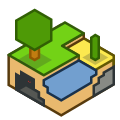 | |
 | |
| Original author(s) | Perttu Ahola |
|---|---|
| Developer(s) | The Luanti Team |
| Initial release | 0.0.1 / November 2, 2010 |
| Stable release | 5.9.1[1] |
| Repository | github |
| Written in | C++, Lua |
| Engine | Irrlicht (Irrlicht-MT fork) |
| Platform | Microsoft Windows, MacOS, Linux, FreeBSD, Android |
| Type | Sandbox |
| License | 2013: LGPL-2.1-or-later[2][3] 2010: GPL-2.0-or-later[4][5] Original: Proprietary[6] |
| Website | www |
Luanti (formerly and colloquially Minetest) is a free and open-source voxel game creation system. It is written primarily in C++ and makes use of the Irrlicht Engine. Luanti has a Lua API allowing users to write their own games and mods. It is cross-platform, being available for Microsoft Windows, macOS, Linux, some BSD descendants, some GNU variants and Android.[7]
An in-game browser lets users download games and modifications from the ContentDB website.[8] The five most popular games by downloads are VoxeLibre, Minetest Game, NodeCore, Tutorial and Subway Miner.[9]
Over a decade of active development Luanti has garnered critical acclaim and gained in popularity; the games, mods and texturepacks on ContentDB have over 14 million downloads combined,[10] and the Android version of Luanti has over a million downloads on the Google Play store.[11]
In October 2024 the name was changed from Minetest to Luanti. The new name is a word play using the name of the programming language Lua and the Finnish word "luonti" meaning "creation".[12]
Gameplay
[edit]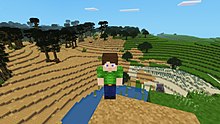
The game world of all Luanti games is composed of voxels which are mostly cubes aligned in a 3D grid, but the player and creatures can move around freely. In Luanti voxels are called nodes. Different nodes represent various materials, such as dirt, stone, ores, tree trunks, water, and lava.
The most popular games for Luanti are VoxeLibre (formerly Mineclone2) and Minetest Game.[13] Both are sandbox building games.
VoxeLibre is a full game with animals, monsters, interesting biomes, whereas Minetest Game is a lifeless sandbox with mostly landscape nodes.
While technically playable without, Minetest Game relies on modifications to add creatures, more biomes, gameplay mechanics, armours, weapons, tools, decorative nodes and so on.
The gameplay of VoxeLibre revolves around picking up and placing these nodes, gathering materials, crafting items and nodes by placing them in a crafting grid in the inventory window, smelting ores in the oven, farming crops, animal husbandry, eating food and defeating monsters to survive. Some nodes can only be picked up with certain held tools the player has to craft.
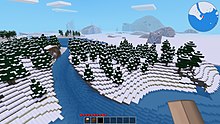
As players explore the world, new areas are procedurally generated, using a map seed specified by the player. A new game puts the player in the center of a voxel cube 62 thousand nodes across, so the player can travel 31 thousand nodes in any direction (sideways, up, or down)[14] before reaching the invisible wall at the end of the world.
The world is divided into biomes ranging from deserts to jungles to snowfields; the terrain includes plains, mountains, forests, caves, and various lava/water bodies. The in-game time system follows a day and night cycle, and one full cycle lasts 20 real-time minutes.
Luanti provides two play style options across games: Enable Damage and Creative Mode. Disabling damage prevents dying, thus losing items and the possible frustration it might cause and Creative Mode provides players with infinite resources to build whatever they want without having to gather them first.[15]
Multiplayer
[edit]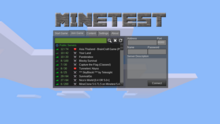
Luanti offers players to play together over the internet or the local network by joining a server or hosting their own.
Players can either connect by IP or select the server from the built-in server browser if the host chose to publish it there by selecting the checkbox.
Instead of centralized account systems proprietary games use for the whole software, Luanti allows registering and logging into accounts on each individual server.
Customization
[edit]
Luanti provides an interface for games and mods written in Lua. Mods are server-side and work out of the box when playing on servers, with no installation required.
Luanti features a built-in content browser showing packages uploaded to ContentDB, allowing users to install games, mods and texture packs with a single click. Over 2500 packages are available there as of Oct 2024[10] and many more on the forums.
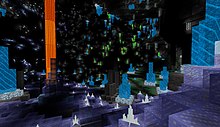
Mods can be used to add or modify nodes, gameplay mechanics, tools, weapons, armour, monsters, player skins and the user interface.
The full source code of Luanti and most of its games and their artistic assets such as textures and sounds, are distributed under free licenses, making it easier to publish modified versions and derivatives.
Development
[edit]
Luanti was originally released in November 2010 under a proprietary license.[6] Shortly afterwards the license was changed to the GPL-2.0-or-later license.[5] By agreement among major contributors, in June 2012 the project license was to be changed to LGPL-2.1-or-later, though at the time small parts still remained under the GPL-2.0-or-later license.[4] In September 2013, the transition was complete.[3] While LGPL-2.1-or-later remains the main license for the Luanti engine, other free and open-source licenses are used for various other parts of the latest release.[2]
Perttu Ahola was the only developer working on the project for about six months, until Ciaran Gultnieks started making code contributions in May 2011.[16] The roster of contributors grew and changed over the years. As of July 2020, there are 9 active core developers and 15 active contributors. Project participants do not have set roles, but rather keep their activity within their respective areas of expertise. Perttu Ahola's role morphed over the years: whereas initially it was engine development, it is now mostly web-hosting and administration, assigning core developer, moderator, and other roles to people, as well as being the final word in cases where other developers are unable to render a decision.[16]
Since version 5.0.0 the in-game browser lets users download games and modifications as well as their dependencies from a website called ContentDB.[8]
As of version 5.8.0 the Luanti Engine no longer ships with a default game.[17]
Usage in education
[edit]Luanti has been used in educational environments to teach subjects such as mathematics, programming, and earth sciences. Such examples are:
- In 2017 in France, Luanti was used to teach calculus and trigonometry.[18]
- At Federal University of Santa Catarina in Brazil, Luanti was used to teach programming in a variant called MineScratch.[19]
- In 2018, for Laboratory Education and Apprenticeships (EDA) at the Paris Descartes University, Luanti was used to teach life and earth sciences to year 6 students who could not observe some phenomena in person but could experience them in the Luanti virtual world.[20]
Reception
[edit]Opensource.com listed Luanti at #1 in its "Best open source games of 2015",[21] stating that it is maybe "the most complete alternative to Minecraft", and noted its expansibility, saying that it contains a user-friendly API for creating mods in Lua.[22] PC Magazine listed Luanti among "The best Sandbox Creation Games for Minecraft Fans".[23]
See also
[edit]References
[edit]- ^ "Release 5.9.1". September 15, 2024. Retrieved September 22, 2024.
- ^ a b "LICENSE.txt". GitHub. October 25, 2021. Archived from the original on January 3, 2023. Retrieved July 8, 2021.
- ^ a b "Remove doc/gpl-2.0.txt, add doc/lgpl-2.1.txt". GitHub. September 28, 2013. Archived from the original on August 6, 2021. Retrieved July 8, 2021.
- ^ a b "Switch the license to be LGPLv2/later, with small parts still remaining as GPLv2/later, by agreement of major contributors". GitHub. June 5, 2012. Archived from the original on August 6, 2021. Retrieved July 8, 2021.
- ^ a b "Working version before block send priorization update". GitHub. November 27, 2010. Archived from the original on August 6, 2021. Retrieved July 8, 2021.
- ^ a b "Initial files". GitHub. November 26, 2010. Archived from the original on August 6, 2021. Retrieved July 8, 2021.
- ^ "Minetest". December 11, 2023. Archived from the original on December 11, 2023. Retrieved December 11, 2023.
- ^ a b "Content Flags". December 11, 2023. Archived from the original on December 11, 2023. Retrieved December 11, 2023.
- ^ "Games". ContentDB. Retrieved May 28, 2024.
- ^ a b "Welcome". ContentDB. Retrieved October 14, 2024.
CDB has 2526 packages, with a total of 14871145 downloads.
- ^ "minetest - Android Apps on Google Play". play.google.com. Retrieved May 28, 2024.
- ^ "Introducing Our New Name". Minetest Blog. Retrieved October 13, 2024.
- ^ "Games". ContentDB. Retrieved May 28, 2024.
- ^ "Official website". Archived from the original on February 26, 2021. Retrieved February 28, 2021.
- ^ "Minetest, Free and Open Source Sandbox Game... | Linux Game News • Minetest, Free and Open Source Sandbox Game Inspired by Minecraft". linuxgamenews.com. Retrieved May 28, 2024.
- ^ a b "Open source game developer Perttu Ahola talks about Minetest with Wikinews". Wikinews. June 30, 2020. Archived from the original on July 12, 2020. Retrieved July 11, 2020.
- ^ "Minetest 5.8.0 released!". December 11, 2023. Archived from the original on December 11, 2023. Retrieved December 11, 2023.
- ^ Boutet, Henri. (January 2017). "Mathématiques et "serious gaming": l'exemple de Minetest" [Mathematics and "serious gaming": the example of Minetest]. Mathématice (in French) (53). Archived from the original on June 29, 2019. Retrieved October 12, 2019.
- ^ da, Rocha, Jhonata (November 23, 2016). "MineScratch: integração minetest-scratch para apoiar o ensino de programação" [MineScratch: Minetest-Scratch Integration to Support Programming Teaching]. Repositório Institucional da UFSC (in Brazilian Portuguese). Archived from the original on February 3, 2021. Retrieved February 16, 2019.
{{cite journal}}: CS1 maint: multiple names: authors list (link) - ^ Pauty-Combemorel C. (February 7, 2018). "Utilisation d'un jeu vidéo dans le cadre de l'enseignement des SVT: le cas de Minetest. De 0 à 1 ou l'heure de l'informatique à l'école" [Using a video game as part of the teaching of Life and Earth Sciences: the case of Minetest. From 0 to 1 or computer time at school.] (in French). Archived from the original on October 11, 2019. Retrieved October 11, 2019.
- ^ Muilwijk, Robin (December 30, 2015). "Best open source games of 2015". Opensource.com. Archived from the original on May 1, 2019. Retrieved February 16, 2019.
- ^ Baker, Jason (October 12, 2017). "10 open source alternatives to Minecraft". Opensource.com. Archived from the original on October 30, 2019. Retrieved October 12, 2019.
- ^ Cohen, Jason (August 28, 2019). "The Best Sandbox Creation Games for Minecraft Fans". PC Magazine. Archived from the original on December 17, 2019. Retrieved December 17, 2019.
- Survival video games
- Sandbox games
- Linux games
- Windows games
- Android (operating system) games
- Multiplayer online games
- Open-source video games
- Open-world video games
- Free and open-source software
- Free and open-source Android software
- MacOS games
- Multiplayer and single-player video games
- 2010 video games
- Minecraft clones
- Lua (programming language)-scripted video games

